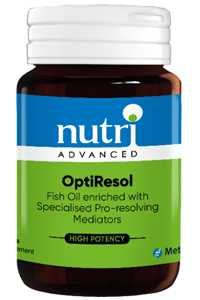Nutri Advanced OptiResol
Fish oil enriched with specialised pro-resolving mediators (SPMs) to support the optimal resolution of inflammation
Features
- Fish oil enriched with specialised pro-resolving mediators, also known as SPMs.
- SPMs are metabolites of omega-3 fatty acids EPA and DHA.
- These key metabolites are 17-HDHA, 18-HEPE and 14-HDHA.
- SPMs are produced by the body but diet, lifestyle or poor health can affect natural production of these metabolites.
- SPMs support the resolution of inflammation, and may be particularly helpful for long-term, chronic inflammation.
Why choose OptiResol?
OptiResol is a fish oil enriched with substances known as SPMs (specialised pro-resolving mediators). Sometimes described as 'next generation fish oil,' SPMs are metabolites of omega-3 fatty acids which may help to promote the optimal resolution of inflammation, following injury or trauma or in those with long-term, chronic inflammation, and promote a return to homeostasis (steady state or normal function).
What are SPMs?
Specialised Pro-resolving Mediators (SPMs) are metabolites derived from the omega-3 fatty acids EPA and DHA. Key SPMs include 17-HDHA, 18-HEPE and 14-HDHA. Whilst these can be produced naturally in the body, production can be impaired by diet, lifestyle choices, illness or age, and these metabolites have recently been identified as key components in the resolution of inflammation, following injury or crisis. Whilst acute inflammation is a normal defense mechanism, if left unresolved, it can lead to long-term, chronic inflammation. This may be linked to low levels of SPMs in the body, because SPMs are thought to play a critical role in returning the body to homeostasis following injury, infection or physical challenge.
How does resolution of inflammation differ from anti-inflammatory action?
Resolution is part of the healing process, the natural way in which our immune systems end the inflammatory response following injury or physical challenge. Resolution differs from the actions of anti-inflammatory agents, which inhibit the natural inflammatory process.
How are SPMs different from omega-3 fatty acids?
Although our body can use omega-3 fatty acids like EPA and DHA to generate SPMs, there are many enzymatic steps involved in this process. The impact of ageing, poor diet and general health status can inhibit the body's production of SPMs from these fatty acids. Supplementing with SPMs directly provides a more targeted and direct support for the body's affected tissues to return to health.
Dosage
1 capsule, or up to 3 daily.
Suitability
Suitable for those looking for support for inflammation, particularly long-term, chronic or infectious inflammation.
If pregnant, breastfeeding, taking medication or have a medical condition, consult a healthcare practitioner before taking this product. If taking anti-coagulants, consult a medical doctor before taking this product.
Contains ingredients derived from: Fish
Encapsulated with:
Gelatin, Glycerol, Silica, Tocopherol-rich extracts.
| Each capsule typically contains: | | % NRV* |
| Fish oil | 500mg | ✝ |
| Omega-3 fatty acids | 337.5mg | ✝ |
| EPA (Eicosapentaenoic acid) | 100mg | ✝ |
| DHA (Docosahexaenoic acid) | 162.5mg | ✝ |
| 17-HDHA (17-hydroxy-docosahexaenoic acid) | 120µg | ✝ |
| 18-HEPE (18-hydroxy-eicosapentaenoic acid) | 112.5µg | ✝ |
| 14-HDHA (14-hydroxy-docosahexaenoic acid) | 55µg | ✝ |
* NRV is the Nutrient Reference Value
✝ NRV not yet established
6960










